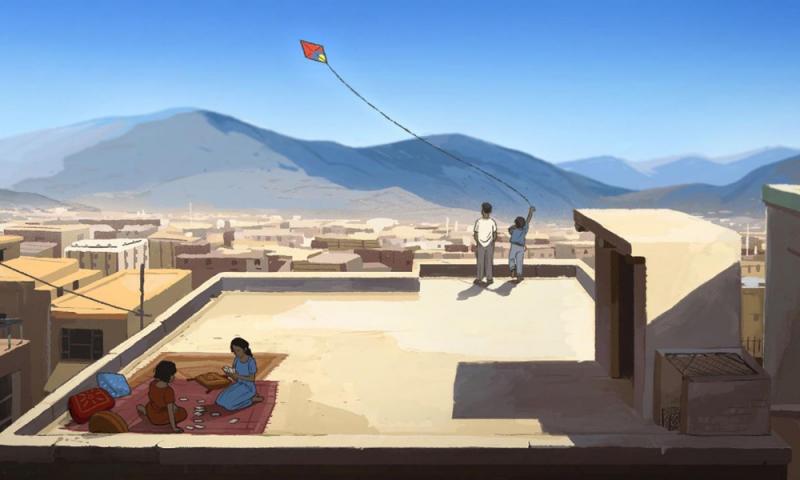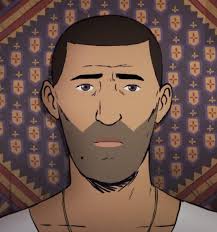Flee review - award-winning documentary portrays the refugee experience | reviews, news & interviews
Flee review - award-winning documentary portrays the refugee experience
Flee review - award-winning documentary portrays the refugee experience
An ingenious deployment of animation and archive

It’s good timing for the release of Flee in UK cinemas. The Danish movie has just made Oscar history by being nominated in three categories – Animated Feature, Documentary, and International Feature and is bound to win in at least one of them.
Flee's director Jonas Pohar Rasmussen tells the story of an old school friend, who was smuggled into Denmark in his teens when he was a desperate Afghani refugee. In order to protect his friend, who had a long, traumatic journey and is now a high-achieving academic, Rasmussen has changed his name to Amin, but we’re assured that this is a true story based on audio recordings.
Animation gives Amin not only anonymity but enables Rasmussen to re-create his friend's long dramatic journey in full, only resorting occasionally to well-chosen archive images of war-torn Afghanistan. Amin had a happy childhood with his family in Kabul (his father was a pilot, his mother a loving homemaker). We meet him as an exuberant child who loves to dress up in his sisters’ clothes; there’s a brief visual reminder of The Kite Runner, the 2007 American art-house drama that covered similar territory.
But this is a more complex story about fleeing a repressive regime. Even before the Taliban, Amin knew he was going to struggle with his culture as he realised at a very young age that he was gay. There’s a lovely moment of humour when he imagines his bedroom poster of martial arts star Jean Claude van Damme is winking suggestively at him. Later he asks a Western doctor if there’s a medicine that will cure him from being attracted to men.
 When the Taliban take over, Amin’s father is captured and his older brother fears being forced into the army. Amin and his sisters flee to Moscow with their mother to wait for asylum. Life there is bleak. Holed up in a run-down housing project, they’re at the mercy of corrupt Soviet policemen and terrified when their visas have expired.
When the Taliban take over, Amin’s father is captured and his older brother fears being forced into the army. Amin and his sisters flee to Moscow with their mother to wait for asylum. Life there is bleak. Holed up in a run-down housing project, they’re at the mercy of corrupt Soviet policemen and terrified when their visas have expired.
Traffickers get the sisters to Sweden via Estonia in a sealed shipping container, but 64 of their fellow refugees die on the journey. Amin and his mother make a later voyage in a boat with a failing engine that lets in water. Rasmussen captures the terror and confusion of these desperate journeys, interleaving sequences of Amin as a child with his adult self recounting painful memories to his friend.
Flee is exemplary in its storytelling and – like Persepolis, Waltz with Bashir, and Wonderland: The Trouble with Love and Sex – proves that animation can create worlds for an audience that would be difficult if not impossible to film as drama. My only proviso amid all the acclaim the film is receiving is that while portraying the Taliban, the traffickers, and the Soviet and Estonian officials as unmitigated villains, all the Danish figures are saintly and tolerant.
Unfortunately, Denmark’s track record on accepting those fleeing war is far from exemplary. Currently, hundreds of Syrians are being kept in dismal deportation facilities as the Danish authorities are determined to send them back. Amin is a success story – we hear of him marrying his Danish boyfriend, moving together to a hygelig house in the countryside and being offered a place at Princeton university. This is the immigrant story that Denmark can be proud of on the international stage as Flee wins prizes. It’s a nice bit of PR that might obscure the condemnation meted out to the country last summer by the European Court of Human Rights.
rating
Explore topics
Share this article
The future of Arts Journalism
You can stop theartsdesk.com closing!
We urgently need financing to survive. Our fundraising drive has thus far raised £49,000 but we need to reach £100,000 or we will be forced to close. Please contribute here: https://gofund.me/c3f6033d
And if you can forward this information to anyone who might assist, we’d be grateful.

Subscribe to theartsdesk.com
Thank you for continuing to read our work on theartsdesk.com. For unlimited access to every article in its entirety, including our archive of more than 15,000 pieces, we're asking for £5 per month or £40 per year. We feel it's a very good deal, and hope you do too.
To take a subscription now simply click here.
And if you're looking for that extra gift for a friend or family member, why not treat them to a theartsdesk.com gift subscription?
more Film
 Honey Don’t! review - film noir in the bright sun
A Coen brother with a blood-simple gumshoe caper
Honey Don’t! review - film noir in the bright sun
A Coen brother with a blood-simple gumshoe caper
 The Courageous review - Ophélia Kolb excels as a single mother on the edge
Jasmin Gordon's directorial debut features strong performances but leaves too much unexplained
The Courageous review - Ophélia Kolb excels as a single mother on the edge
Jasmin Gordon's directorial debut features strong performances but leaves too much unexplained
 Blu-ray: The Graduate
Post #MeToo, can Mike Nichols' second feature still lay claim to Classic Film status?
Blu-ray: The Graduate
Post #MeToo, can Mike Nichols' second feature still lay claim to Classic Film status?
 Little Trouble Girls review - masterful debut breathes new life into a girl's sexual awakening
Urska Dukic's study of a confused Catholic teenager is exquisitely realised
Little Trouble Girls review - masterful debut breathes new life into a girl's sexual awakening
Urska Dukic's study of a confused Catholic teenager is exquisitely realised
 Young Mothers review - the Dardennes explore teenage motherhood in compelling drama
Life after birth: five young mothers in Liège struggle to provide for their babies
Young Mothers review - the Dardennes explore teenage motherhood in compelling drama
Life after birth: five young mothers in Liège struggle to provide for their babies
 Blu-ray: Finis Terrae
Bleak but compelling semi-documentary, filmed on location in Brittany
Blu-ray: Finis Terrae
Bleak but compelling semi-documentary, filmed on location in Brittany
 Oslo Stories Trilogy: Sex review - sexual identity slips, hurts and heals
A quietly visionary series concludes with two chimney sweeps' awkward sexual liberation
Oslo Stories Trilogy: Sex review - sexual identity slips, hurts and heals
A quietly visionary series concludes with two chimney sweeps' awkward sexual liberation
 Sorry, Baby review - the healing power of friendship in the aftermath of sexual assault
Eva Victor writes, directs and stars in their endearing debut feature
Sorry, Baby review - the healing power of friendship in the aftermath of sexual assault
Eva Victor writes, directs and stars in their endearing debut feature
 Blu-ray: Who Wants to Kill Jessie?
Fast-paced and visually inventive Czech comedy
Blu-ray: Who Wants to Kill Jessie?
Fast-paced and visually inventive Czech comedy
 Oslo Stories Trilogy: Love review - freed love
Gay cruising offers straight female lessons in a heady ode to urban connection
Oslo Stories Trilogy: Love review - freed love
Gay cruising offers straight female lessons in a heady ode to urban connection
 Beating Hearts review - kiss kiss, slam slam
Romance and clobberings in a so-so French melodrama
Beating Hearts review - kiss kiss, slam slam
Romance and clobberings in a so-so French melodrama

Add comment